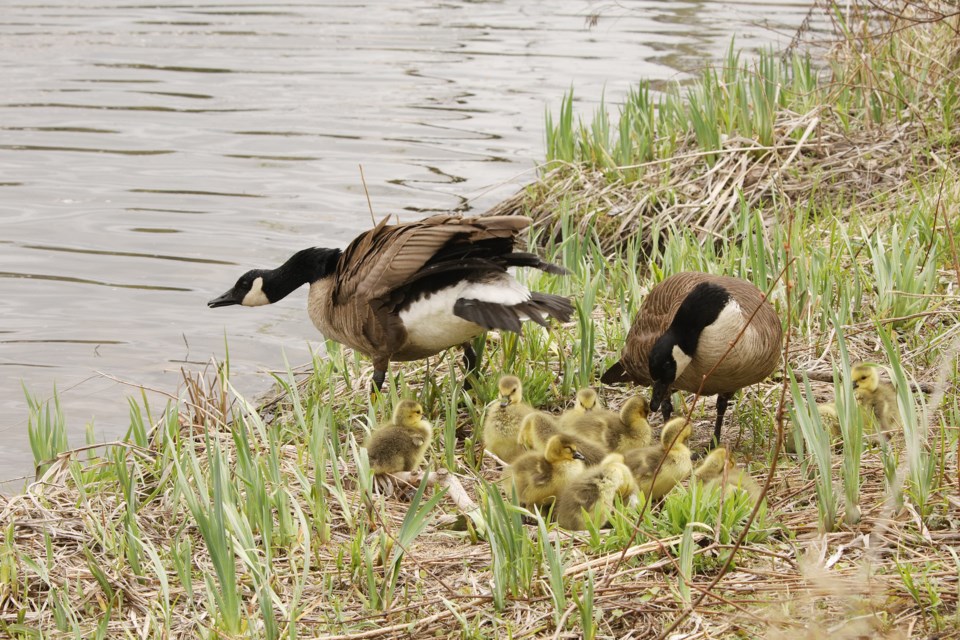With poop, noise and nests, geese are making themselves known in Newmarket, and the town is planning out how to best manage the birds.
Nesting season is underway for Canada geese, with the creatures appearing in parks, including at Fairy Lake. The town has budgeted $25,000 for a study this year to examine best management practices, meant in part to respond to complaints.
Newmarket biologist Aileen Barclay said Newmarket has plenty of clear, grassy areas that are ideal conditions for the geese.
“It’s like giving them an all-you-can-eat buffet, and when that grass area is next to water, you’re giving them safety … We’re creating habitat that is perfect for them, and they’re thriving,” Barclay said. “I would like to see a lot less mowing, but unfortunately, people still have the impression that you need to have a clean environment, and that creates areas that lack biodiversity … It’s a bigger picture on just how we manage our landscape in general.”
Geese populations have thrived across North America in recent years after rebounding, with an estimated seven million in North America, according to the Government of Canada. They have become prevalent in urban settings, but that has led to some conflict, with residents straying too close to birds aggressively protecting their nests, or geese nesting around parking lots and becoming a traffic hazard.
The study to come is meant to examine the town’s current practices in-depth and the leading-edge solutions in other municipalities. Councillor Bob Kwapis pushed to keep the study in the 2022 budget and said feces are deterring the use of lawns at parks, particularly around Fairy Lake.
Forestry supervisor Joerg Hettmann said the study will help with the town’s long-term, strategic approach to managing geese. But he said the town has an ongoing, operational approach to handling the population, whether with public education, planting native plant species along rivers, or oiling eggs to prevent them from hatching.
“It’s focusing on finding a balance between the geese population within our parks and waterways, and the general public,” he said. “The focus is on safety for the public in terms of managing things like feces in waterways. As well as, when the birds get overpopulated, they can get aggressive in defending their nests.
“We’re not trying to get rid of the birds,” he added. “We’re focused on trying to find a stable balance.”
Hettmann said the town is gathering more data on the birds and is currently aware of 12 nests. He said they try to address public complaints by cleaning and addressing where they are congregating.
“Especially on the Tom Taylor Trail system and along the Holland River. Those are the key areas of concentration at present,” he said.
Although the study is still to come, Hettmann said new management practices from other jurisdictions could include more planting of shrubs along the waterfront, as well as trained dogs that can disturb the birds' peace and get them to nest elsewhere.
“Whatever techniques you choose, it’s a long-term approach that needs to be sustained,” he said. “Finding a balance between having geese as part of our environment, but at the level that is suitable and safe for the patrons of the park … We always look for a balance. So that we can create the most varied and enjoyable environment.”
Barclay said creating a natural vegetative strip along the water is the most effective way to deter geese populations, but it can get frowned on in populated settings. She said Newmarket has done that well at Fairy Lake, but open settings will still always attract the birds.
“It’s compounded by people sometimes feeding the ducks and geese, which they shouldn’t be doing,” Barclay said.
As Newmarket examines the issue, Barclay said she hopes that the town sees the benefit of naturalized shorelines. She said it can increase biodiversity and create a better general environment for Newmarket.
“To see things change, you’re going to have to change the landscape,” she said. “To do that without too many people complaining, you’re going to have to educate.”
